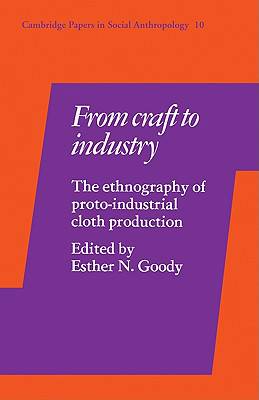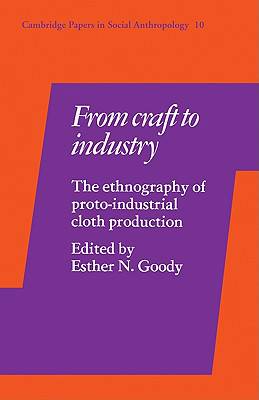
Bedankt voor het vertrouwen het afgelopen jaar! Om jou te bedanken bieden we GRATIS verzending (in België) aan op alles gedurende de hele maand januari.
- Afhalen na 1 uur in een winkel met voorraad
- In januari gratis thuislevering in België
- Ruim aanbod met 7 miljoen producten
Bedankt voor het vertrouwen het afgelopen jaar! Om jou te bedanken bieden we GRATIS verzending (in België) aan op alles gedurende de hele maand januari.
- Afhalen na 1 uur in een winkel met voorraad
- In januari gratis thuislevering in België
- Ruim aanbod met 7 miljoen producten
Zoeken
From Craft to Industry
The Ethnography of Proto-Industrial Cloth Production
€ 64,95
+ 129 punten
Omschrijving
The essays in this volume focus on two themes: the centrality of the production of and trade in cloth in the emergence of market activity; and the nature of the industrialization process. The core of the book is formed by four detailed ethnographic studies of the development and current organization of cloth production for the market, in different parts of the world: tailoring in Kano City, northern Nigeria (Pokrant); dyeing and weaving in Daboya, northern Ghana (Goody); 'fashion'- shirt production in Bombay, India (Swallow); and the manufacture of 'handmade' Harris tweed in the Hebrides (Ennew). Each study examines access to raw materials and to the market, relations of production, the investment of capital and the reproduction of the system. Individually, they raise such questions as the role of fashion, the effects of national economic policies and legislation, and factors related to the modification of traditional technologies.
Specificaties
Betrokkenen
- Uitgeverij:
Inhoud
- Aantal bladzijden:
- 232
- Taal:
- Engels
- Reeks:
- Reeksnummer:
- nr. 10
Eigenschappen
- Productcode (EAN):
- 9780521104982
- Verschijningsdatum:
- 19/03/2009
- Uitvoering:
- Paperback
- Formaat:
- Trade paperback (VS)
- Afmetingen:
- 140 mm x 216 mm
- Gewicht:
- 299 g

Alleen bij Standaard Boekhandel
+ 129 punten op je klantenkaart van Standaard Boekhandel
Beoordelingen
We publiceren alleen reviews die voldoen aan de voorwaarden voor reviews. Bekijk onze voorwaarden voor reviews.








